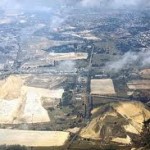Money Gives Power But Lacks Ethics
A drought had forced these people into gold mining. They were subsistence farmers and when the rain failed to provide enough water they adapted to mining the gold near the surface by hand. And what compensation did the government provide? None what so ever.
The area is only about 20 miles from the Sahara desert, and industrial mining requires huge amounts of water! The company plans to dam the river. When the company spokesman was asked about the effect on people down stream, the reply was, “That is a question we do not discuss out loud.”
Of course, expropriation of land to be sold to cash-carrying corporations is quite common. Look at Indonesia and Malaysia expropriations for palm oil plantations. Not only are rainforests destroyed, carbon dioxide is increased and environmental damage is produced.
Or consider Mozambique expropriating land to be sold to Saudi Arabia firms for agricultural production. Saudi Arabia wants to conserve its water, now that more of its population is becoming affluent and wants a better life style. Does the money from oil sold to the advanced world make Saudi’s more deserving than the residents of Mozambique?
And Brazil is taking the rain forest for corn and soya beans produced by corporate farmers, causing the soil to become hard as brick in some areas in a few years. Once the rain forest is gone it can’t be brought back, because most of the nutrients are in living and decaying plants, not the mineral part of the soil.
What about the Niger Delta, much of which today is foul and uninhabitable due to oil extraction by world class corporations? Where is the ethics in all of this? It all involves buying off a government and using its force to gain industrial ends. No wonder there is low grade war in many of these places.
I once met a man who said, “You can’t make an omelet without breaking a few eggs.” That’s a rather concise way of stating what is called “Social Darwinism.” The idea is that the strong destroy the weak and that is nature’s way. Today “Social Darwinism” is a pejorative, as it should be. It is properly associated with eugenics, imperialism and racism. It is the opposite of what is taught by the world’s major religions, which attempt to bring people together. When we can cooperate we all do better.
How does this relate to shale drilling, the extreme technology now being promoted as the savior of national, and indeed world security, and economic advancement? Fortunately, only a few people are put out on the street, and few killed outright, but many are having health endangered, life style altered, property values lowered, and prospects for the future dimmed. Government is managed by a wily few and the government ignores the dirty work.
The result is a few elite are having their lifestyle improved and power increased. Most people suffer a loss. So where is the ethics? It is missing, just like the Ethics and International Affairs article says. It’s about power. All about power. Use of the coercive power of the state for the benefit of the ones controlling the government.
That’s the reason for the big bucks in my recent article about money in politics being a “good” investment. This sort of thing is not unusual, it’s been going on for thousands of years. The population increases and the natural resources decrease. Fighting is easier than adapting, particularly when some are powerful and some weak.
The story, the myth, that makes these schemes work is that the ultimate users need the material. Actually, alternate ways to meet the demand are available – either other materials or other ways of doing things. The ultimate user is told the story in such a way that he/she is not aware of the full story of recovering the resources, any more than he/she knows about the dirty, wretched cows that milk comes from. It is all done for the “power ” (money).
These schemes are like the snake, of Indian mythology, swallowing its tail. From the beginning the end gets closer and closer, but it cannot go on forever. We are part of the 22 civilizations Arnold Toynbee describes in the series “A Study of Civilization”. Are we about to be dominated by those who lack creativity?
Money Gives Power But Lacks Ethics


{ 1 comment… read it below or add one }
This is the very first time I have visited your web page and I was surprised with the interesting and important material that I have found.
While there may be some disagreement, it is clear that the problems on the ground are very very serious and being mostly neglected by Governors, Congress and the regulatory branches of the state and federal government.
The accidents continue along pipelines, on well pads and on the roads. The accidents are continuing. Clearly, some regulations would reduce these accidents.